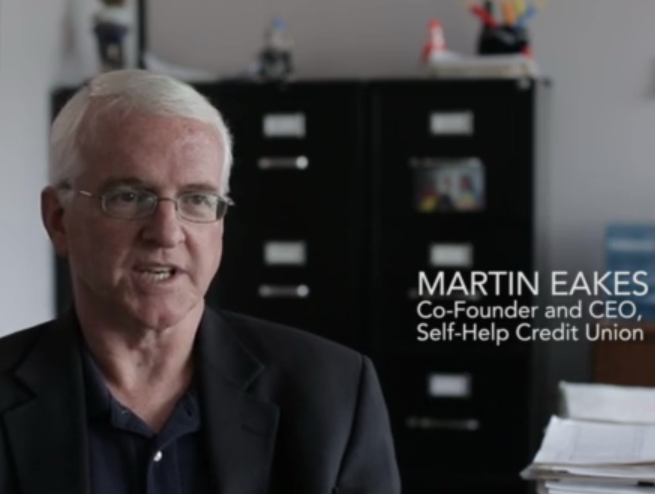Preserving the social fabric: Southern community development financial institutions

Martin Eakes, the CEO of Self Help Credit Union in North Carolina, says the people traditional banks turn away are actually the best customers. (Image is a still from video below.)
The Mary Reynolds Babcock Foundation funds organizations in the South working to move people and places out of poverty. The foundation recently launched a "Southern Voices" oral history project to capture the stories of Southern leaders working for social and economic justice. The latest installment features stories about organizations that provide non-predatory financial services in the region. For more stories from the project, click here. (Disclosure: The Mary Reynolds Babcock Foundation is a funder of the Institute for Southern Studies.)
* * *
A new survey is shining a harsh spotlight on the urgent need for non-predatory financial services in the South. A recent Gallup poll found minority-owned businesses face tougher challenges obtaining loans. The study, commissioned by Wells Fargo, found that 77 percent of black business owners use their own personal cash to finance their businesses, and 47 percent of black-owned businesses are in the South. As a result of the findings, Wells Fargo says it "will extend $50 million in investments and $25 million in grants to organizations called Community Development Financial Institutions that serve small businesses and entrepreneurs." CDFIs operate with a mission to build wealth in underserved communities. Funding from government, foundations and individual donors allows CDFIs to improve access to small business capital, affordable housing and personal savings. All over the South, CDFIs and credit unions are filling the yawning gaps left by big banks.
Through grantmaking and program-related investments, the Mary Reynolds Babcock Foundation has long been a supporter of CDFIs in the region. One of the first was Self Help Credit Union, which opened its doors just as North Carolina's manufacturing sector started closing its doors. "What we found was that, particularly poor families in poor neighborhoods, they didn't have the cash to start a business. So in 1983, we had this wild idea that we would start our own bank because there weren't any banks that really were willing to take a risk on low-income, black women in Halifax, North Carolina," said CEO Martin Eakes. "Half of the businesses that we were trying to assist should have been able to access credit and get started but they couldn't simply because they were located on the wrong side of the tracks."
Eakes says the people traditional banks turn away are actually the best customers, and they've contributed to Self Help's rapid growth. "We work directly with families and communities to buy homes, rebuild buildings, buy cars for families that need to be able to go to work – just very basic necessities for economic survival. And Self Help has grown; we're almost $2 billion in assets now, we have made $6 or $7 billion of loans to poor people who have been unbelievably great borrowers and repayment. They've been very strong. In fact, I sometimes joke that poor people are much better credit risks than rich people are, who can always walk away and not suffer much consequence."
Arkansas-based Communities Unlimited offers financial and technical assistance to entrepreneurs in seven southern states. "In the Delta, you have among the most persistently poor communities in the country; you have poverty rates upwards of 22, 23 percent; you have unemployment double-digit, regardless of what happens at the national level," said CEO Ines Polonius. "Our focus, and what we see, is an amazing pool of entrepreneurs – courageous, creative and persistent. And we serve 300 new entrepreneurs a year and we've been doing this for 16 years! … And they're young entrepreneurs, they're older entrepreneurs, they're women, they're men, they're African-American, they're Hispanic, they're Caucasian. And there's just this spirit of risk-taking and of saying, ‘If I can't get a job, I'll create one.' And that's what's so inspiring to us here, and that's why we're here and that's why we're gonna stay here. And that's why we're gonna keep doing this work."
In rural Georgia, the Federation of Southern Cooperatives/Land Assistance Fund has helped communities that couldn't access capital start their own credit unions. Former Executive Director Ralph Paige says the benefits go far beyond funding. "They got people to put up five-dollar shares with a purpose of lending money to tobacco growers and to farmers where they could raise a crop, and they paid it back. But more than that, those folk made decisions about lending the money to their neighbor, putting their money up, made decisions about who to lend it to, they made decisions about educating themselves about financial education, they made decisions to serve on the board, on the credit committee, the loan committee. … It's about people helping themselves and their communities."
In a 2012 MRBF video about CDFIs, South Carolina Community Loan Fund (formerly Lowcountry Housing Trust) Executive Director Michelle Mapp described the impact they can have on families. "What it does is it gives families stability knowing that you have some place you can come home to tonight that's safe and decent but also knowing you can afford it. Then you can concentrate on the other aspects of your life."
In addition to providing stability for families, organizations like Access to Capital for Entrepreneurs keep small businesses afloat, including SarahCare, an adult daycare center in Snellville, Georgia. "By our ninth month, we ran out of money, and I said, ‘You know, this is pretty hard. We're taking money from our own household to either meet payroll or cover our rent expenses," said founder Aysha Cooper. She didn't meet the big banks' underwriting criteria, so she turned to ACE for help. "Without a loan from ACE, our doors would've had to close and we would've disappointed a lot of people, so I'm ever indebted into ACE."
Eakes says there's a lot on the line – not just individual businesses, homes or even communities. "Organizations like Self Help and others that are working to create economic opportunities for the bottom 50 percent are actually working to save the country's democracy. If we don't make progress there, the social fabric will tear apart."
